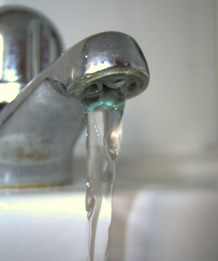
The water industry processes 17 billion litres of water across 335,000 km of mains each day to deliver water to our taps.
Engineers find leaky pipes with Artificial Intelligence
University of Exeter engineers have pioneered new methods for detecting leaky pipes and identifying flood risks with technologies normally used for computer game graphics and Artificial Intelligence.
These techniques could help to identify water supply and flooding problems more quickly than ever before, potentially saving people from the traumatic experience of flooding or not having water on tap.
These new techniques have been presented by a team from the University of Exeter’s Centre for Water Systems at the conference Computing and Control for the Water Industry 2011.
Existing methods for detecting leaks often result in false, so-called ‘ghost’ alarms. University of Exeter engineers have developed a new approach, based on technology originally developed in the field of Artificial Intelligence. The new technology is implemented as a piece of software located on a computer in the control room of a water company. The software continuously receives and processes data coming from the flow and pressure sensors installed in the water system. It then searches for anomalies indicating the presence of the leak. When a potential problem is identified, an alarm is generated to notify the control room operator. The operator also receives information on the likely location of the leak and suggestions of immediate actions to take to isolate it.
Computer games rely on a powerful graphics processing unit (GPU) to draw complex scenes in real time. From the first games with flat, 8-bit graphics, the power of GPUs has grown to support the current 3D graphics that feature life-like effects. University of Exeter researchers have developed methods for using this technology to assess and visualise flood risks much faster than it has been possible ever before. Water companies and local authorities could soon be using this technology to help them identify problems and react to them to reduce risks and potential consequences.
Professor Zoran Kapelan of the University of Exeter’s Centre for Water Systems said: “Each day the UK water industry collects, treats and supplies more than 17 billion litres of water carried across 335,000 km of mains. To maintain this phenomenal operation the water companies need to continually improve their systems. We are using the latest Artificial Intelligence and computer gaming technologies to help them find ways of identifying leaks and other problems faster than ever before.”
His colleague Professor Dragan Savic, Director of the Centre for Water Systems, added: “Clean drinking water, safe disposal of sewerage and the safety of our homes from flooding are something we take for granted in this country. But these services are the result of a huge, complex operation that requires considerable investment so research like this is essential.”
This research was presented at the conference Computing and Control for the Water Industry 2011, held at the University of Exeter from 5 to 7 September 2011. The conference is organised by the University of Exeter’s Centre for Water Systems, Imperial College London, the University of Sheffield and De Montfort University. The 11th conference of its kind, it has this year attracted attendees from over 25 countries.
Established in 1998, the Centre for Water Systems conducts research into some of the most pressing issues facing society today: How can towns and cities provide clean water to an ever-growing population? In the face of climate change, how can we ensure that drought does not leave some groups short of water while others are at risk of flooding? Can water companies find new ways of dealing with water provision and sewage to reduce rising costs for consumers?
Date: 5 September 2011
